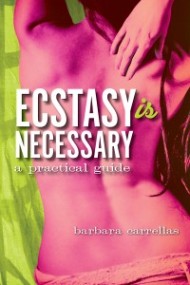I ran from my kinks long before I took my first step towards them.
Looking back they were always there, the childhood crushes on Wonder Woman, Morticia Addams, and Catwoman. Tantalizing thoughts of being tied up, being beaten, or “forced” to do all kinds of things to women and men. The precocious obsession with the misc. category in the back pages of the alternative weekly; and hours of teenage masturbation to kink and swinger contact magazines, my porn of choice along with femdom erotica.
I was fascinated by the kinky things people did; amazed they could just do it, own it, advertise it. Even so, I knew this was not for me. To be beat, to serve, to get fucked… not part of the masculinity I knew, not part of who I could be; so submissive desire got locked away alongside those inconvenient emotions and bisexuality.
The boy became a man, the man I was expected to be. I met a woman barely out of my teens, fell in love, got married, had kids; those pesky thoughts never had a reason to surface, yet they didn’t go away. I’d think of them and turn my attention elsewhere. I’d masturbate to images that would disgust me before the orgasm was done. I’d think endlessly about talking to my wife about my desire, afraid she’d no longer see me as a man. I’d fantasize about actually pursuing these experiences on my own, but knew it would be wrong, shame stacked on shame. I began listening to kink and sex-positive podcasts, and discovered that there were many people who shared these thoughts, that wondered if they were ok, or who embraced their sexuality, or both. I dove into those podcast episodes, found online forums and websites, and began to chip away at the shame.
The ideas that sex acts were straight or gay, that gender was more than a binary should not have been a revelation, yet it was. That there was more than one way to have a relationship and that sexuality could be wonderfully complex had somehow fallen outside my grasp. As I write this I am embarrassed that I could have been so naive, so foolish. Unquestionably believing that sex was so simple, when the sexuality of real people is so varied that deviance is the norm. I had bought the sex shaming and misogynistic narrative one sitcom episode at a time.
My journey towards my kink began as baby steps. The self-exploration of ass play and toys I hid deep in the closet while awash in post-orgasm shame. The acceptance of myself as bisexual even if that identity only existed online. Moving past the idea that a man could only receive pleasure through his cock, becoming comfortable with nipple and ass play. The years of working up to asking my wife to peg me, a request met with a blank stare and misguided hope that the failure to say “no” was a “yes”, as I asked again and again. My journey continued as I began to open up more, not because it was safe but because my ability to repress my desire was breaking down as if I had no choice. Telling my wife of my submissive fantasies and desire to serve her; and after many failed attempts, the day I told her that I had bisexual desires and wanted to experience a broader range of my sexuality. Nearly a year later she began to open up to me about her hidden desire and we decided to explore our sexuality together, leading to a rebirth of our relationship and many fun times before the marriage crumbled from years of accumulated neglect and resentment that choked our growth and blocked our ability to relate to each other as things changed.
This journey has been one of evolving identity and surprising revelation. I entered a dungeon for the first time (3 1/2 years ago) with nothing but submissive thoughts, and left finding I was actually a bottom. A month later I was handed a flogger and took aim at a willing ass and got shockingly hard, I guess I was a switch. I saw knife play and was terrified, needles came out and I left the room, I was kinky but no edge player. I observed DS couples and knew that I was not into submission and was certainly no dominant. I watched heavy SM play; I was into sensation but no masochist, and what kind of person is a sadist? Then I went to Burning Man and when asked if I wanted to try fireplay, I said yes (as one does at Burning Man). I was surprised to find how I loved the warmth of the fire on my skin, the hand sensuously sweeping behind the flame, the fear, the relaxation, the swoon; an experience that weeks earlier I would have dismissed entirely.
This past Saturday night I had 20 needles pushed slowly into my skin, threaded two or three times, then dragged out with an excessive amount of alcohol to maximize the sting. It hurt and I loved it. Afterwards, still abuzz with floaty brain chemicals I realized that I am a masochist after all, as if waiting for someone to certify me as one. Along the way I had found that I am a bit of a sadist, finding that the infliction of pain upon the willing has the effect of a little blue pill. I have played with DS, and while I do not identify as a dominant I enjoy the role in scene (and the days leading up to one), and am now in a relationship where I am beginning to explore submission. I’m still very much the switch, wanting to experience as a bottom what I have enjoyed inflicting as a top, and topping informed by my experience and desire as a bottom. A passion for fire, electricity, knives, and needles has pushed my boundaries far beyond where they once stood and while I still have limits, I now know that they’re likely to continue to evolve over time.
I identify as a bisexual hetero-romantic non-monogamous kinky switch, a top, a bottom, at times submissive, sadistic, masochistic, and hedonistic; a cis-man unconcerned by others expectations or understanding of gender roles. It took a long time to get here and I’m proud to say that I am now living my kink, living as myself. I still have regret over how I allowed others expectations get in the way of being true to myself, of allowing myself to be ruled so senselessly by shame, and the role that this played in ending my marriage. I still find that I have difficulty asking for what I want despite now being in a relationship where I am encouraged to do so. And while there are regrets, there is much I’m proud of having arrived at this point, at raising 3 sex-positive teens, and the blogging and outreach I have done to help others with their journeys. Over the past couple of years my writing slowed down then stopped as problems in my marriage left me feeling like a sex-positive fraud. I am now back on the path of growth, connected with myself, and running towards my kinks.






















